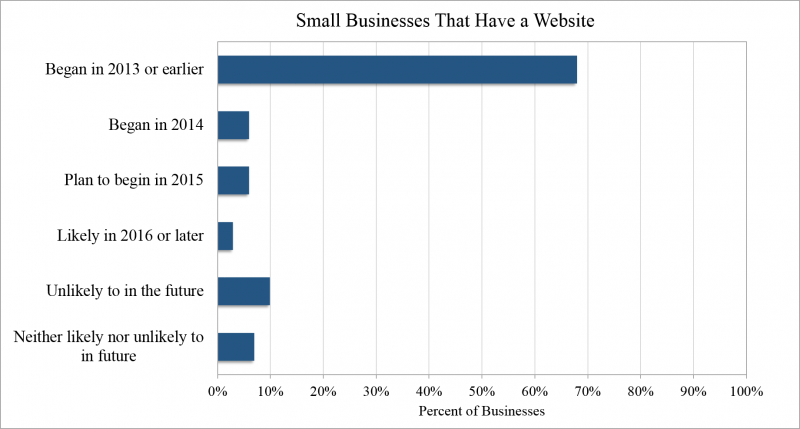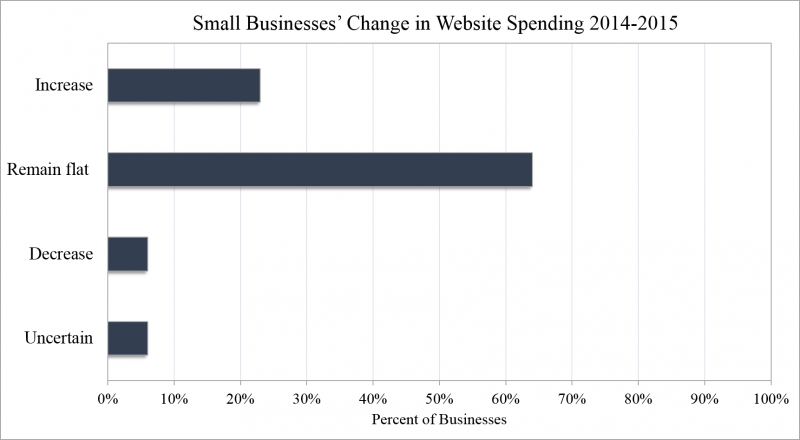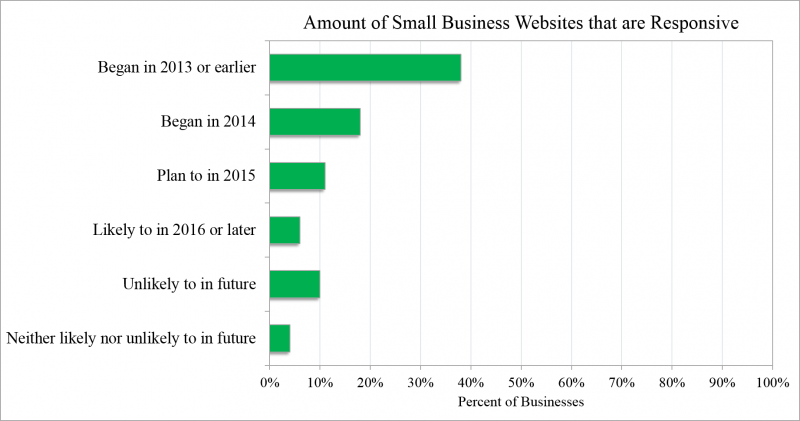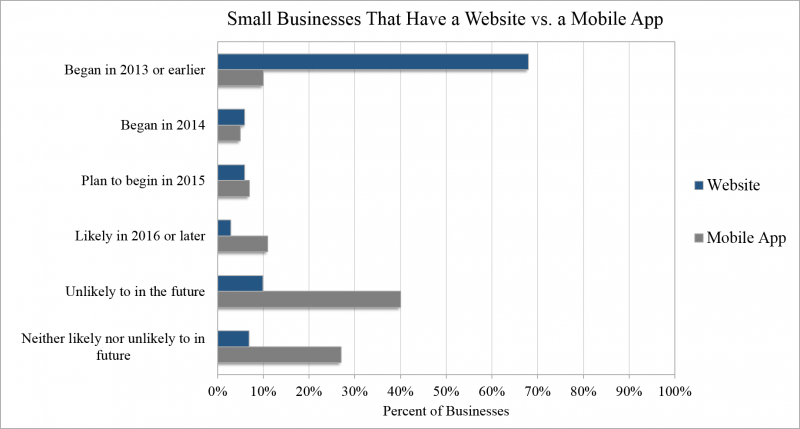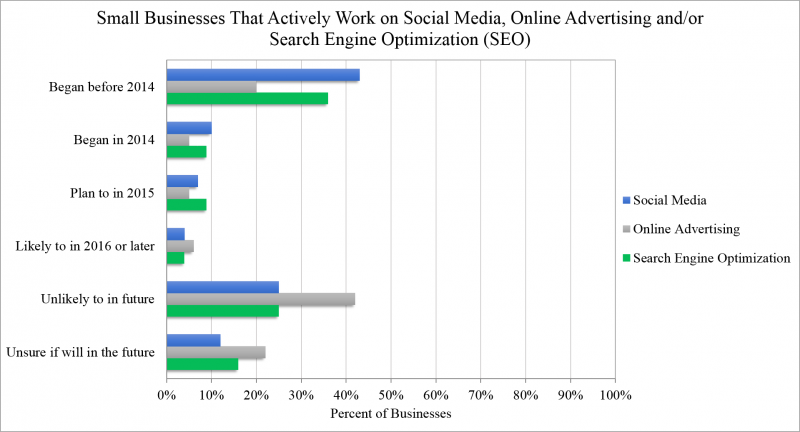2015 Digital Marketing Survey
How are small businesses adapting to the digital marketing realm?
[source: Clutch] An online presence is increasingly significant and small businesses can immensely benefit from a digital marketing strategy. Clutch conducted a survey to determine the digital marketing tendencies of small businesses, including digital marketing budget, Website creation and updates, mobile application creation, search engine optimization, online advertising, and social media. We then took the survey results to digital marketing experts for their insights.
Digital Marketing
We found that almost half of small businesses dedicate only 20 percent or less of their marketing budget to digital marketing. Small businesses have been slow to adopt digital marketing strategies, even though these strategies can be highly advantageous. Ted Risdall, chairman and CEO of Risdall Marketing Group, addresses small business’s lack of adaption to the Web and to digital marketing as a marketing tactic.
“For the biggest human communication revolution ever in mankind’s history, it’s still surprising to me the adoption rate to really get going on digital marketing. Seems to be 20-plus years now of having Websites out there on the planet that we continue to slowly embrace these different, new ways to do things.”
— Ted Risdall, Risdall Marketing Group
A digital marketing strategy can vary depending on the business. Some small businesses solely want a Website that customers can easily find to learn more about their services. Some businesses want to build a strong online following that can generate leads and conversions digitally. Others are fully committed to an online presence and rely on diverse digital strategies to completely run their business. There is an abundance of options for a business to develop a successful digital marketing strategy, starting with a Website.
Small Business Web Presence
A Website is the fundamental core of an online presence and digital marketing strategy. A Website introduces a business, providing an in-depth description of employees, services, and products. It offers informational substance that is searchable online and is ideally available from any device with an Internet connection. The availability of the Internet on mobile and portable electronic devices increases the need for Websites to be available on these devices. Thus, responsive Websites, mobile sites, and sometimes mobile apps are important for a business’s online presence on any device.
Ted Risdall clarifies the significant relationship between digital marketing and an ample Website.
“We’re seeing a lot more clients start with digital marketing as a foundation. A Website is absolutely a store front online where you have to have to be present, and that’s shifting towards being mobile friendly, too.”
— Ted Risdall, Risdall Marketing Group
We asked our survey participants if their business has a company Website.
- A substantial 74 percent of respondents said that they have a company Website, however over a quarter of respondents reported that they do not have a Website.
- Of the businesses that said they do not have a Website, 9 percent said that they have plans to build a Website in the future while 10 percent said that that they are unlikely to build a Website in the future.
The high percentage of small businesses with a Website exemplifies the importance of having an online presence, a point that Andrew Ruditser, lead technology coordinator and co-founder of MAXBURST(link is external), emphasizes.
“I don’t know how anyone today can realistically be in business without having a proper online presence. It’s kind of as important as having a professional looking business card. In my opinion you cannot effectively compete or market yourself without a Website, you must have one.”
— Andrew Ruditser, MAXBURST
Even though the overwhelming majority of small businesses in our survey have a Website, 26 percent still do not have a Website and 10 percent claim that their company is unlikely to have one in the future. Joel Swanson, president of public relations at Risdall Marketing Group, attempts to depict who this 10 percent might consist of.
“Maybe some just have one gigantic customer, like the government is their only customer, something like that would make some sense to me. For the vast majority of companies or organizations in general, even if they’re not using a Website to generate leads, like a consumer product might do, Websites are still where people go to vet out a company or organization, find out more about the leaders, and what’s happening in their company, just to gauge whether they want to do business with them, whether it’s a company or organization that fits with who they’re looking to partner with.”
— Joel Swanson, Risdall Marketing Group
Furthermore, Garry Kanfer, Vice President of Big Drop Inc., offers insights on the type of small business that would not have a Website.
“The 10 percent that don’t have a Website, they’re probably old school companies, that don’t believe they need a Website. The only companies that we feel don’t have a Website are startups that are just opening their company. We hardly see any companies today that don’t have Websites.”
— Garry Kanfer, Big Drop Inc.
Overall, we found that those businesses without a Website probably do not rely on any online activity to educate their customers or to generate leads for new customers. These companies are most likely finding their success through traditional methods of marketing or client references and connections. On the other hand, we concluded that businesses that have a Website are finding ways to make their Website adaptable to different devices beyond the standard desktop computer.
Website Improvements and Mobile Presence
We further surveyed the respondents that said their business has a Website, and inquired on how they expect spending on their company Website to change from 2014 to 2015. This includes spending on Web design, Web development, and hosting. Of the small businesses with a Website, almost a quarter expect to increase spending on their Website in 2015.
Ted Risdall describes some of the common Website improvements that they have been addressing in the past year.
“One thing that we’re seeing a lot of is wrapping marketing automation efforts and lead tracking efforts into Website improvement efforts, so more on the back-end. We also see a lot of clients now moving towards more compelling types of content, such as video and infographics that take a little bit of resources to implement and create.”
— Ted Risdall, Risdall Marketing Group
Ken Braun, the founder and chief creative officer at Lounge Lizard, explains some of the Website improvement requests that Lounge Lizard have been getting recently.
“We have been getting a large amount of sales leads from companies that want to convert their old Website, which is just for desktop, and make it compatible to the tablet browsing platform as well as the mobile browsing platform.”
— Ken Braun, Lounge Lizard
Andrew Ruditser also clarifies some of the Website improvements that MAXBURST have been responding to, most notably making Websites responsive.
“Most business owners generally understand the importance of a mobile Website strategy. Websites must work across all different platforms and devices that are used in today’s market and they have to work seamlessly. We’re getting a lot of interest and work with companies contacting us and saying, ‘We have this outdated Website. We need a redesign. We need it to be mobile optimized, responsive.’ So that’s a big shift I’m seeing right now with business owners upgrading their online presence.”
— Andrew Ruditser, MAXBURST
For a Website to be user friendly on a mobile device, or on another handheld device, it must either have a separate mobile Website that is built specifically to work on a mobile device or it must have a responsive Web design. A Website with a responsive design is adaptable to the platform that it is prompted to appear on, it is able to change the size of elements on the Web page to fit to a specific screen size.
The respondents that said their business has a Website were also prompted on whether their Website has a responsive design.
- Of the small businesses with a Website, 56 percent said that their Website has a responsive design.
- However, 31 percent of respondents revealed that their Website is not responsive, and 10 percent claimed that they are unlikely to make their Website responsive in the future.
- Moreover, 17 percent of respondents said they have plans to make their Website responsive in the future.
For the small businesses that do not have a responsive Website, but plan to in the future, the time for an update is imminent. The immediacy of this update is of instantaneous importance alongside Google’s new algorithm update, set for April 21, which favors mobile optimized Websites. A Website that is not mobile friendly will suffer in mobile searches and interactions, and small businesses must be aware of how this can affect their mobile presence.
Garry Kanfer comments on the increase of Web traffic from mobile devices and on the need for businesses to have a responsive design Website.
“Everybody wants their site to be responsive due to the fact that, as of today, close to 35 percent to 40 percent of the visits come from mobile devices and tablets, which even a couple years ago was 20 percent. Since small businesses see an increase of visits from mobile and tablets, they understand that it’s mandatory for their site to be responsive. We didn’t take one job last year that wasn’t responsive. When we consult our clients, we explain to them what responsive is, and we explain to them that all of our sites and all of our jobs are responsive.”
— Garry Kanfer, Big Drop Inc.
Ted Risdall expounds reasons that a business might have for building a separate mobile site instead of making a current Website responsive.
“Sometimes it’s not just the site itself being responsive, it’s a whole separate mobile site. Some Websites are so complicated that just trying to make it responsive isn’t going to work. Some of the businesses that say their Website is not responsive might fit into the category, where they’re actually creating a mobile site instead.
— Ted Risdall, Risdall Marketing Group
Instead of updating a Website to be responsive, some businesses might have reason to build a separate mobile Website or a mobile application. A mobile app is a downloadable application that is easily accessible on different devices. Certain types of small businesses might have the need for a mobile presence in the form of a mobile app, either in addition to their Website or as their main presence.
We compared our survey results on whether a small business has a Website and/or a mobile app, and found that the results are heavily skewed towards having a Website. However, there are still some small businesses that find value in having a mobile app.
- There is a noticeable difference between the two categories, 74 percent of respondents have a Website, while only 15 percent have a mobile app.
- Of the businesses that said they do not have a mobile app, 18 percent said they have plans to build one in the future while 40 percent said they are unlikely to build one in the future.
Joel Swanson responds to the lack of small business owners that have a mobile app.
“For a small business, they really need to have a really specific need or engagement type need to justify building a whole separate app. It’s just too big of a budget item otherwise.”
— Ted Risdall, Risdall Marketing Group
Andrey Gabisov, digital director of GLOBAL POINT NY, explains what small businesses would choose to build a mobile app.
“We don’t see our clients invest a lot in mobile apps. Small business, big business, they’re trying to avoid this right now. Except for small businesses that have the application as the cornerstone of their business model, but this is an outlier.”
— Andrey Gabisov, GLOBAL POINT NY
There is a high percentage of small businesses that is unlikely to have a mobile app in the future, an obvious obstacle is the high cost of developing a mobile app. Unless a small business has a distinct need for a mobile app, spending on this high budget item is not of immediate importance. A small business will probably benefit more from updating their Website to be mobile friendly than from building a separate mobile app.
Overall, a good portion of small businesses that have a Website are seeing the benefits of increasing spending and in updating their Websites so they can be available on different devices. It is important for a Website to be available on any device, especially when different digital marketing strategies lead customers back to a company Website.
Digital Marketing Strategies
There are several different digital marketing strategies that small businesses can use to increase Website traffic, to obtain leads and conversions, and to gain loyalty and trust from other businesses and customers. We asked survey participants if their company actively works on search engine optimization, online advertising, such as Google AdWords, and social media.
- Comparing the three categories, social media has the highest usage, 53 percent of small businesses said that they have an active presence on social media.
- A similar amount of small businesses said that they actively work on SEO (45 percent) while only 25 percent said that their company does online advertising.
- Furthermore, 24 percent said that they are unlikely to work on social media in the future, 25 percent said that they are unlikely to work on SEO in the future, and 42 percent said that they are unlikely to work on online advertising in the future.
Although each category shows that almost a quarter or more of participants are unlikely to work on one or more of the strategies in the future, respondents are most resistant to online advertising.
“[Online advertising] kind of has a stigma where people feel like paid ads are less likely to be looked at. When done correctly it is extremely effective. It’s not a set it and forget it event. A really effective paid strategy involves proper tweaking to the ads message, budget and target landing page. Trends and other metrics change frequently so you must keep up to date with the campaign. When a PPC strategy is done correctly it can be highly effective.”
— Andrew Ruditser, MAXBURST
Online advertising, such as Google AdWords, allows companies to track analytics and results on a day-to-day basis. Companies are able to look at immediate results and change parameters if they are not acquiring their desired results. Conversely, SEO is a more long-term strategy to increase the organic search reach of a business Website. SEO is important for search results and for getting a business recognized for associated search keywords. By using online advertising alongside SEO tactics, small businesses can be more successful in their digital marketing strategy.
“Paid search advertising should be implemented at the start of an organic SEO campaign. Getting high-ranking organic search listings on the first page of Google takes time. Having paid search results during this ramp up period is more expensive, but at least there’s exposure. As the organic search listings start moving up the ranks, cut down a little on your pay per click. There is more value eventually, at the end of the day, on organic search listings. Potential customers are more likely to click on a natural search result vs. a paid one.”
— Ken Braun, Lounge Lizard
“SEO is a long-term strategy and is extremely important for every business to perform, but results do not happen overnight. If a company needs immediate results, then I typically do a combination of organic SEO and PPC. Paid Ad campaigns, like Google AdWords, provide the business owner with instant gratification. They put a suggested amount of money into the campaign for ads to begin to display to prospective customers. These ads will potentially draw prospective customers to your Website.”
— Andrew Ruditser, MAXBURST
Ted Risdall brings up a valid point, emphasizing that small businesses must have a sufficient Website to cater to the leads from digital marketing strategies like paid advertising and SEO.
“PPC ads are only as good as the Website page that you send them to, once they click through. If those smaller companies have a template Website or a weak system of landing pages to help convert those folks that go to the Website, they-re not going to see as strong of a return. It’s hard to make money on PPC if they don’t have a good place to send them.”
— Ted Risdall, Risdall Marketing Group
For more details on how small businesses are using SEO and PPC see our recent article on╩SEO and PPC in 2015.
Social media is the most widely used digital marketing strategy in our survey, with over half of small businesses saying they have an active presence. However, a quarter reported that they are unlikely to use social media in the future. Garry Kanfer explains the importance of having both a Website and a social media presence.
“I feel that in today’s industry, 25 percent of businesses that are unlikely to use social media is a very big number. When consumers look at your business, most of the consumers want to see who you are. So, in order for them to see who you are and what you’re about, your Website is good, but they also want to look through your social media pages, and they want to look through review pages. Social media pages explain who you are, help you connect with consumers, and help you to gain repeat business.”
— Garry Kanfer, Big Drop Inc.
Social media can be a source for general information and news about a company, a way for a business to interact with its customers, as well as a way to improve organic search results. Small businesses can greatly benefit from social media, allowing them to reach potential clients that they might not have been able to interact with otherwise. Social media and a company Website can be mutually beneficial to each other, as social profiles link to a company Website and a company Website offers customer interactions and news with links to their social profiles.
SEO, online advertising and social media are digital marketing strategies that help Website recognition and traffic. Small businesses have been lagging in their adoption of different digital marketing strategies. Even though 74 percent of respondents have a company Website, overall, small businesses are not utilizing different digital strategies to help grow their online authority. Ultimately, SEO, paid advertising and social media can uniquely benefit a small business’s digital marketing strategy.
“When you start to talk about digital marketing campaigns, they’re often a lot less expensive than other types of campaigns. So the costs in general are going to be a lot lower to do paid search, or content marketing, or other digital campaigns. I think that it actually lowers the entry point for a lot of small businesses that want to get into it in the first place and want to start doing something meaningful. That first something meaningful is having that store front online and being there when people are searching for the kinds of things you do.╙
— Ted Risdall, Risdall Marketing Group
Conclusion
Digital marketing success depends on a business’s goals and on the strategies they use to meet those goals. An ample digital marketing budget is essential, if a business is not allocating enough of their total marketing budget to digital marketing then it is very hard to use certain strategies effectively.
The strategies we included in our survey ideally overlap and complement each other. A Website is crucial to an online presence, and it must be updated to remain user-friendly alongside new technology. SEO, online advertising, and social media are all strategies that point back to a company Website.
Our survey only included some of the main strategies for digital marketing, there are other strategies that we did not address, and there will continually be new strategies that develop. As many of the experts we spoke with pointed out, small businesses can greatly benefit from many of these strategies, yet there is still a delay in adopting them. An online presence is crucial for a small business, as the Web continues to accelerate its influence, online accessibility continues to enable more customer interaction.
Survey Respondents
Clutch collected this survey data from 354 small business owners or managers distributed across the US. The largest respondent group is made up of companies with less than 10 employees and less than $1 million in revenue. The majority of companies surveyed predict relatively flat revenue growth in 2015.

